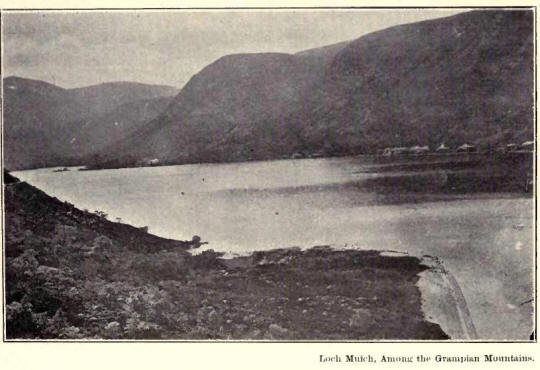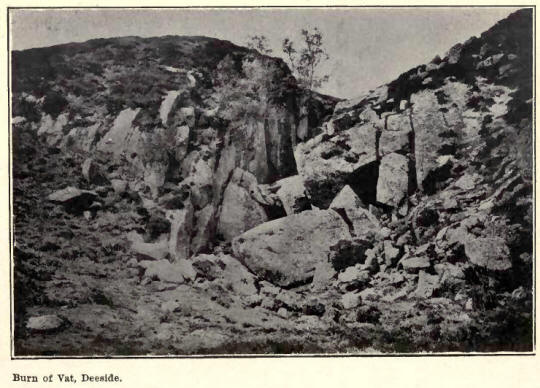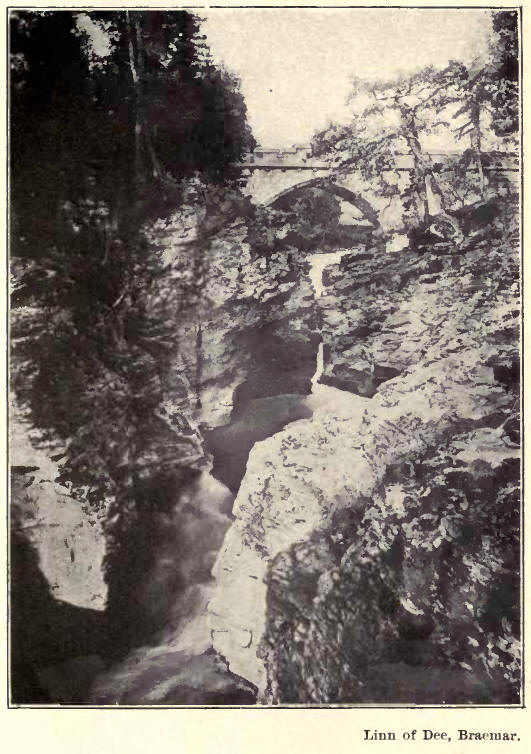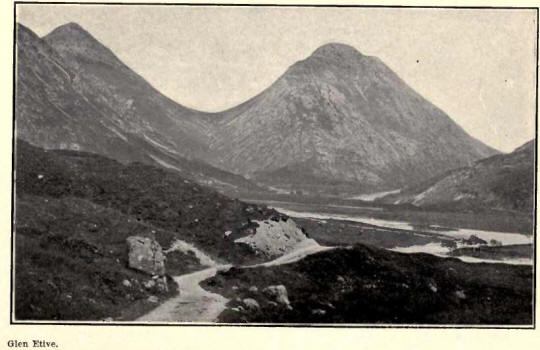|
"My mother sang a plaintive song,
Which winter nights beguiled;
And as its echoes died along,
She wept, and yet she smiled.
'My child,' she said—I hear her yet,
Her kind eyes bent on mine;
'Thou'rt young, and dost
perchance forget
That
native land of thine;—
That land of heath and mountain gray,
So far from you and me.'"
A Sprig of Heath
Flower of the waste! the heathfowl shuns,
For
thee, the brake and tangled wood,
To thy protecting shade she runs:
Thy tender buds supply her food;
Her young
forsake her downy plumes,
To rest upon thy opening blooms.
Flower of the desert, though thou art,
The deer that range the mountain free,
The
graceful doe, the stately hart
Their food and shelter seek from thee;
The bee
thy earliest blossom greets,
And draws from thee her choicest sweets.
Gem of the heath! whose modest bloom
Sheds beauty o'er the lonely moor;
Though thou
dispense no rich perfume,
Nor yet with splendid tints allure,
Both
valour's crest and beauty's bower
Oft hast thou deck'd a favorite
flower.
Flower of the wild! whose purple glow
Adorns
the dusky mountain's side,
Not the gay hues of Iris' bow,
Nor garden's artful varied pride,
With all its
wealth of sweets could cheer,
Like thee, the hardy mountaineer.
Flower of my heart! thy fragrance mild,
Of peace and freedom seem to breathe;
To pluck
thy blossoms in the wild,
And deck my bonnet with the wreath,
Where
dwelt of old my rustic sires,
Is all my simple wish requires.
Flower of my dear-loved native land!
Alasl when distant, far more dear,
When I, from some cold foreign strand,
Look homeward through the blinding tear,
How
must my aching heart deplore
That home and thee, I see no more!
—Mrs. Grant, of Laggan.
The Flowers of Scotland
What are the flowers of Scotland,
All others that excel—
The lovely flowers of Scotland,
All others that excel?
The thistle's purple bonnet,
And bonny heather-bell,
O, they're the flowers
of Scotland,
All others that excel!
Though England eyes her roses
With pride she'll ne'er forego,
The rose has
oft been trodden
By foot
of haughty foe;
But the
thistle in her bonnet blue
Still nods outow'r the fell,
And dares the proudest foeman
To tread the heather-bell.
For the wee bit leaf o' Ireland,
Alack and well a-day!
For ilka hand is free to pu'
An' steal the gem away.
But the thistle in her bonnet blue
Still bobs aboon them a';
At her the bravest darena blink,
Or gi'e his mou' a thraw.
Up wi' the flowers o' Scotland,
The emblems o' the free,
Their guardians for a thousand years,
Their guardians still we'll be.
A fie had better brave the deil
Within his reeky cell,
Than our thistle's purple bonnet,
Or bonny heather-bell.
—James Hogg, the Ettrick Shepherd.
A Sprig of White Heather
A sprig of white heather I pluck'd on the brae;
To whom shall I give it?
To whom shall I give it?
Not to the sportive, the light, and the gay,
Not to Jessie with flashing display,
In the flush of June, when the roses are out,
Flinging her frolicsome fancies about
But beautiful Phoebe, to thee, to thee,
Thou deep-thoughted Phoebe, to thee!
A sprig of white heather I pluck'd on the brae;
To whom shall I give it?
To whom shall I give it?
Not to the haughty, the high, and the proud,
Not to Clotilda, who sails through the crowd
With a lofty look and a
fine disdain,
As if all
were born to hold her train;
But beautiful Phoebe, to thee, to thee,
Thou
mild-eyed Phoebe, to thee!
A sprig of white heather I pluck'd on the brae;
To whom shall I give it?
To whom shall I give it?
Not to the clever, the keen, and the knowing,
With eye never resting, and tongue ever going,
Not to Rebecca, who
all has read
That goes,
and goes not into hear head;
But beautiful Phoebe, to thee; to thee,
Thou silently-loving, to thee!
A sprig of white heather I pluck'd on the brae;
To whom shall I give it?
To whom shall I give it?
I'll give it to one, or I'll give it to none,
I'll give it to Ph9ebe, my beautiful one;
The rare white bloom that peeps from the brae
So chaste and so pure 'mid the purple display;
It grew, dear Phoebe, for thee, for thee,
Thou rarest and fairest, for thee!
—John Stuart Blackie.
The Heather
Though with the rose's flaring crimson dye
The heath flower's modest blossom ne'er can vie,
Nor to the bland caresses of the gale
Of morn, like her, expand the purple veil,
The swain, who 'mid her fragrance finds repose,
Prefers her tresses to the gaudy rose,
And bids the wild bee, her companion come
To
soothe his slumbers with her airy hum.
Sweet, modest flower, in lonely deserts dun
Retiring still for converse with the sun,
Whose sweets invite the soaring lark to stoop
And from thy cells the buried dew-drop scoop
Though unobtrusive all
thy beauties shine
Yet boast thou rival of the purple vine I
For once thy mantling juice was seen to laugh
In pearly cups, which monarchs loved to quaff;
And frequent waked
the wild inspired lay
On
Teviot's hills beneath the Pictish sway.
—Leyden.
Scotland
The glowing furze, the "bonny broom,"
The thistle, and the heather;
The blue-bell and the gowan fair,
Which childhood likes to gather.
—Robert Chambers.
The Faded Heather
It is recorded of the Highland emigrants to Canada
that they wept because the Heather would not grow in their newly adopted
soil.
There may be some too brave to weep
O'er poverty or care or wrong
Within whose manly bosoms sleep
Emotions gentle, warm and strong;
Which wait
the wakening of a tone,
Unmarked, unthought of by the crowd,
And seeming unto them alone
A voice both eloquent and loud;
And then the feelings, hid for years,
Burst forth at length in burning tears.
He wept, that hardy mountaineer,
When faded thus his loved heath flower.
Yet 'mid the ills of life, no tear
Had wet his cheek until that hour;
You might have deemed the mountain tree
Had sooner shrunk before the blast,
Or that
his native rock should be
Bent by the winds which hurried past,
Rather
than he a tear should shed
Because a wild flower drooped its head.
It would not grow—the heather flower
Far from its native land exiled,
Though breezes from the forest bower
Greeted the lonely mountain child.
It better loved the bleak wild wind
Which blew upon the Highland hill,
And for the rocky heath it pined
Though tended both with care and skill;
An exile on a stranger strand,
It languished for its native land.
0, if the heather had but grown,
And bloomed upon a foreign scene,
Its owner had not felt alone,
Though a sad exile he had been.
But when he marked its early death,
He thought that, like his mountain flower..
Withered beneath a foreign breath,
He soon might meet his final hour,
And die a stranger and alone,
Unwept, unpitied and unknown.
—Anne Pratt, in "Flowers and Their Associations."


Heath
Oft have I marked thee, Heather, blooming free,
When care and culture came not, on the wild,
And deemed thou
wert too beautiful to be
Left in the desert like a thing exiled;
Then have I brought thee where the garden smiled
With many a blossom not more lovely graced;
But thou wert Freedom's own—her darling child,
And when in trim enclosure fondly placed
Wouldst languish soon, and die, mourning thy
Pative waste.
So might of old some warrior captive pine
Amid the seven-hilled city's splendour—erst
His home was by the Danube or the Rhine,
Where Freedom's self his glowing spirit nursed.
Now the thick air, which, breathed by slaves is cursed,
Stifles his free-born soul—as men beneath
Close dungeon vaults for heaven's pure breezes
thirst,
He suffocating
pants for freer breath
And welcome's Misery's friend, the slave's soul refuge,
Death.
Frazer's Magazine.
Flowers of the Moorland
Wild flowers of the moorland, ye are very dear to
me;
Ye lure my dreaming
memory as clover does the bee;
Ye bring back all my childhood loved, when
freedom, joy and health
Had never thought of wearing chains to fetter fame and wealth.
Wild blossoms of the common land, brave tenants of
the earth,
Your
breathings were among the first that helped my spirit's birth;
For how my busy brain would dream and how my heart
would burn,
Where gorse
and heather flung their arms above the forest fern.
—Eliza Cook.
The Heather at My Door
If I were king of France, that noble fine land,
And the gold was elbow deep within my chests,
And my castles lay in scores along the wine-land
With towers as high as where the eagle nests;
If harpers sweet, and swordsmen stout and vaunting
My history sang, my stainless tartan wore,
Was not my fortune poor, with one thing wanting—
The heather at my door.
My galleys every ocean might be sailing,
Robbing the isles and sacking hold and keep,
My chevaliers with loyalty unfailing
Might bring me back of cattle, horse and sheep,
Soft arms be round my neck, the young heart's tether,
And true love-kisses all the night might fill,
But oh! Machree, if I had not the heather
Before me on the hill.
A hunter's fare is all I would be craving,
A shepherd's plaiding and a beggar's pay,
If I
might earn them where the heather, waving,
Gave fragrance all the
day.
The stars might see
me, homeless one and weary,
Without a roof to fend me from the dew,
And
still, content, I'd find a bedding cheery,
Where'er the heather grew.
—Neil Munro, in "Blackwood's Magazine," 1896.
To a Wild Heath Flower
Sweet flowered from Nature's indulgence thou'rt
cast,
Thy home's on the cold heath, thy nurse is the blast,
No
shrub spreads its branches to shelter thy form,
Thou'rt shook by the
winds, and thou'rt bent by the storm;
But the bird of the moor on thy substance is fed,
And thou giv'st to the hare of the mountain a bed;
In youth,
from the cold winds thou'lt grant them a space,
And in age, when the fowler's at war with their
race;
The winds may assail thee, the tempest may rage,
They
nature is proof to the war which they wage;
Thou'lt smile in the
conflict, and blossoms unfold,
Where the nurslings of favor would
shrink from the cold;
Though rugged and sterile the seat of thy birth,
Simplicity formed
thee of beauty and worth.
Remain, then, sweet blossom, the pride of
the moor,
In loneliness flourish, unpamper'd and pure—
Expand in
the tempest, and bloom on the brow,
An emblem of sweet independence
art thou;
And the soul
who beholds thee unhurt in the strife,
Shall learn to contend with
the troubles of life;
And when the cold wind of adversity's felt,
And the shafts of affliction are ruthlessly dealt,
His spirit, unbroken, shall rise to the last,
And his virtues shall open and bloom in the blast,
And his joys shall be sweet when the storm is at rest,
And the
sunbeam of glory shall play on his breast.
—John Jones.
On the Hills
I love the hills, the lonely hills.
Where never a sound is heard,
Save the soft, sad songs of the purling rills,
Or the cry of a wandering bird;
O!there; O! there;
In the silence rare,
Mv sonl with sweet music is stirred.
I love the hills, the heathery hills,
Where the
wild Bowers sweetly blow,
And smile at the sun while their fragrance
fills
The breath of the breezes low;
O!
there; 0! there;
I
banish life's care,
And
happiness only I know.
I love the hills! the sombre hills,
In silvery
moonbeams drest,
Where
the curlew calls in sorrowful trilts.
From its lonely distant nest;
O! there; O! there;
In the night-hushed air,
I speak with the Spirit of Rest.
—Win. Allan.
Heath
How oft, though grass and moss are seen
Tanned bright for want of showers.
Still keeps
the ling its darksome green,
Thick set with little flowers.
—Moorland Blossoms.
Scotch Heather
Bright purple bloom of Scotland's hills,
Garb
of her mountains, glens and rills,
At sight of thee my bosom fills
With memories proud,
Of tartans, thistles, snuff, meal-mills,
And
mist-wet cloud.
Thy stem is like some fir-tree green
With twinkling bells hung thick between;
Pressed to the earth, thou low dost lean,
But scorns to break,
Up-springing quick as ne'er had been
Foot on
thy neck.
Thou'rt like the man when Fortune's tread
Falls fell and crushing on his head
Who bows, but when the blow has sped
With
dauntless will
He
struggles up from sorrow's bed,
A soldier still.
On storm-crest crags of dusky white
Where
brackens wave their fans of light,
And rowans drop their berries
bright
The clefts
between;
Thy breast of
purple on the height
So richly seen.
Home of the moor-cock, snipe, and deer,
The
gaudy pheasant crowing clear,
The partridge brown, that schemes her fear
With draggled wings;
And
dappled grouse, when man draws near,
That whirring springs.
Oft have I climbed the steep hill's side
'Mong
hairsts of heather, deep and wide,
When sweet dust flew at every
stride
Like
spendthrift's money,
And
yellow bees could scarce abide
The smell of honey.
On thee has patriot Wallace trod,
Who bled to break the tyrant's rod;
And oft
the Covenanter's banner broad
Has swept thy bloom,
Proclaiming at the pike's sharp shod
Oppression's doom.
But why should thy small purple flower
Be dyed
with blood in peaceful hour,
On moors, where men who creep and cower.
With guns resort,
To pour on birds a leaden shower
And call it sport?
When dogs and guns are laid to sleep,
'Neath
the cleft moon thy sweet bells weep
To hear the plaintive dying peep
From birds half killed,
As, from soft breasts, sore wounded deep,
Their life's distilled.
No more the dusky legs will spring,
No more
will spread the speckled wing;
A bloody head does earthward hing,
No more to live-
'Tis sport to some who take the thing
They
cannot give.
Badge of true manhood and the brave,
Long may
thy purple glory wave
O'er moor and bill, when red guns rave,
And death's abroad;
To shield the weak thou canst not save,
Bright
flower of God.
—From
"Law Lyrics," by Robert Bird, 1887.
Solitude
Oh! beautiful those wastes of heath,
Stretching for miles to lure the bee,
Where
the wild bird, on pinions strong,
Wheels round and pours his piping
song,
And timid
creatures wander free.
—Mary Howitt.


The Heather
O sweet is the breath of the heather
On braes of the Highlands that blows;
O rich
is its bloom when at evening
The hills glow in purple and rose.
I sit on the slopes of Loch Etive,
The heather is up to my knee;
I look to the
west where the islands
Arise from the far gloaming sea.
The peak of the mighty Ben Cruachan
Above me
soars up in the mist;
Below, by the waters of Etive,
The feet of the proud one are kist.
I see the grey strength of Dunstafinage
Keeping wars on the way of the seas,
And faintly the roaring of
Connal
Is heard in the
lull of the breeze.
Here, lapped in the stillness of Nature,
Afar
from the dwellings of men,
My spirit is rapt by the magic
That breathes over mountain and glen.
Around are the footprints of Fingal,
And Ossian, the last of his race:
Here Dermid
and Oscar and Fillan
Have wakened the storm of the chase.
O voices of heroes long vanished,
Ye live, overcoming the tomb;
While lingers the music of Ossian
Round hills where the heather doth bloom.
Where glances the light on the waters
That dash bewixt Mull and Lismore,
The
long-ships of Hako went flashing
The raven to battle that bore.
O valiant offspring of Odin!
The drop of your blood that's in me
Still
fires at the thought of the prowess
That made you the Kings of the
Sea.
Beneath yonder slope good King Robert,
When the brooch from his shoulder was torn,
Cut his way through the pass, while he reddened
With the blood of the clansmen of Lorn.
O conquering sword of King Robert!
How good to have followed with thee
To strike
a strong blow for old Scotland,
The day that she rose to be free.
The wind from the heights of Glen Etive
Comes laden with voices of woe
'Tis the dirge
that forever and ever
Is
borne from the depths of Glencoe.
O ghosts of the brave Clan MacIan I
Still yours is that terrible glen,
Once blithe with the voices of children,
The gladness of women and men.
I think of the days of Prince Charlie,
When the North spent its valor in vain,
And
the blood of the brave and the loyal
Was poured at Culloden like rain.
Now passed like the mist on the mountains
Are the days when such deeds could be done;
The clansmen are scattered forever,
The race of the chieftains is run.
And gone are green-coated fairies
That brightened the hillside of old,
The
witches that rode on the tempest
The Gruagach* that haunted the fold.
And passed are the sights dread and solemn
Vouchsafed to the eye of the seer,
The lights, and the sounds, and the phantoms,
That filled every clachan with fear.
The life of the days that have fleeted
Comes
back not with vision or spell;
So rest ye, dim shadows of cloudland-
Ye fairies, for ever farewell!
O thoughts of the past! ye bring sadness,
And vain is the wish that once more
The great
grassy glens that are silent
Were homes of the braves as of yore.
Sleep, brave ones and bards that have perished,
And green be your places of rest
And light be the winds that go sighing
O'er the children whom Nature loved best.
The soft dewy steps of the gloaming
Are climbing the sides of the Ben,
The last flush of light crowns with glory
The Herdmant that watches the glen.
Here, wrapped in my plaid in the heather,
I
envy no monarch his bed.
Come, dreams of the hills and the Highlands,
And visit in slumber my head.
—Sheriff Nicholson, in "Good Words."
Clover and Heather
There are greetings the wide world over,
And blossoms wherever we roam,
But none like
the heather and clover
To welcome the wanderer home.
Warm-hearted with kindred devotion,
Twin sisters in sympathy true,
They whisper
across the wide ocean,
Love-laden with memory's dew.
In purple tints woven together
The Hudson shakes hand with the Tweed,
Commingling with Abbotsford's heather
The clover of Sunnyside's mead.
A token of friendship immortal
With Washington Irving returns—
Scott's ivy
entwined o'er his portal
By the "Blue-eyed Lassie" of Bums.
Their names by heather-bells wedded
With fondness Columbia retains;
In freedom's
foundation imbedded
The
lay of the minstrel remains.
Ay, this their commission and glory,
In
redolent bloom to prolong
Love, liberty, legend, and story,
That blossom in ballad and song.
So here's to the clover and heather
Of riverside, mountain and glen,
As I stand wi' doffed bonnet and feather
At the yett of my forbears again.
—Wallace Bruce, in "Clover and Heather."—Copyright
by the author.
The Heather
o heart of mine, the heather's out, the miles of
purple heather,
And all
the world's a-scent with it and dripping with the dew
There's just a little fragrant breeze as light as
thrush's feather,
Come
out, my love, where harebells dance, the sunbeams wait for you.
O, heart of mine, the heather's dead, the miles of
purple heather,
The blue
mist wreathes the mountain's side, the storm wind whistles free.
Ah! was it only yesterday we roamed the hills
together?
My heart is
dead as heather bells a-shiver on the lea.
—Pall Mall Gazette.
|

